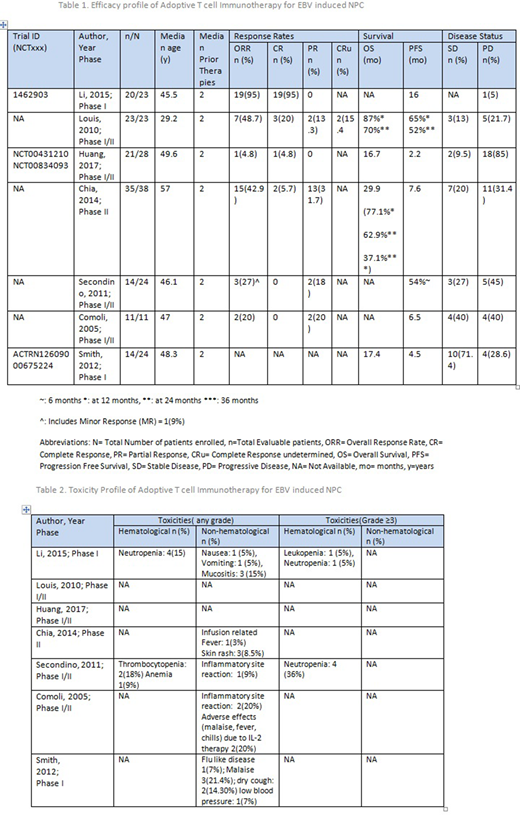Introduction:
Nasopharyngeal carcinoma (NPC) is defined as the cancer of squamous epithelium lining nasopharynx. The single most common culprit of undifferentiated NPC is the Epstein-Barr virus (EBV). Recurrent local-regional or metastatic NPC cannot be treated with repeated chemo-radiotherapy because of poor overall survival and profound effect of these therapies on quality of life. One safer approach is immunotherapy with autologous EBV specific cytotoxic T lymphocytes (EBV-CTLS) targeted to the EBV antigens EBNA1, latent membrane protein LMP1, and LMP2 expressed by most NPC tumors. This study aims to review the efficacy and toxicity of adoptive immunotherapy with EBV-CTLS in patients with EBV induced NPC.
Methods:
A systematic search of PubMed, Embase, Clinicaltrials.gov, and Web of Science was performed for adoptive immunotherapy in EBV induced NPC patients from inception to May 28, 2020. Out of 604 studies, 07 phase I and II clinical trials were selected for the systematic review.
Results:
A total of 134 patients (pts) were evaluated out of 157 pts. 56 had a locoregional disease, 63 had distant metastasis, 15 had both locoregional disease as well as distant metastasis, 8 were in remission and disease status was unknown in 5 pts.
Li et al. (2015) in their phase I clinical trial on 20 NPC pts with ECOG performance status of <3 after chemoradiotherapy (CCRT) showed overall response rate (ORR) of 95% with complete response (CR) in 19 patients. One patient showed progressive disease (PD). Median progression-free survival (PFS) was observed to be 16 months. Eighteen (90%) pts showed disease-free survival of greater than 12 months after adoptive cell therapy (ACT). Grade (G) ≥3 adverse events (AEs) included leukopenia (5%) and neutropenia (5%).
Phase I/II dose-escalation trial by Louis et al. (2010) on 23 pts showed ORR of 48.7% (20% CR, 13.3% undetermined complete response [Cru], 15.4% PR) among pts with active disease. Eight pts remained in remission while 10 had metastatic disease at the time of infusion. PD was 21.7%, Stable Disease (SD) 13%, and 3 pts (13%) had recurrent disease. The median time to progression was 1059 days with PFS of 65% and 52% at 1 and 2 years respectively while the (Overall Survival) OS was 87% and 70% at 1 year and 2 years respectively. There was a higher risk of disease progression (HR: 3.91, P= 0.015) and decreased overall survival (HR: 5.55, P=0.022) in metastatic disease as compared to locoregional disease.
Huang J. et al (2017) conducted a phase I/ II trial in 21 pts with a mean waiting period of 71 days after chemotherapy. Two CTL infusions were given 2 weeks apart. Two pts (9.5%) maintained SD but all other pts (85%) showed PD after 8 weeks follow- up. One patient achieved CR (4.8%). Hence, ORR was 4.8% while median PFS and OS were of 2.2 months and 16.7 months respectively.
In a phase II trial, 24 patients completed 6 EBV- CTL therapy cycles after receiving chemotherapy cycles of Gemcitabine and Carboplatin. ORR was observed to be 42.9% (CR 5.7%, PR 31.7%). SD was 20% while PD was 31.4%. Median OS was 29.9 months (95% CI 20.8-39.3) with 1, 2, and 3-year rates being 77.1%, 62.9%, and 37.1 % respectively. Median PFS was 7.6 months (95% CI 7.4-8.4). All G≥3 AE occurred during chemotherapy. (Chia et al, 2014)
Secondino et al. (2011) conducted a phase I/II study in 11 NPC patients who also received chemotherapy consisting of cyclophosphamide and fludarabine. After a mean follow-up of 4 weeks, ORR was 27% (PR 18%, Minor Response [MR] 9%). PD was reported to be 45% and SD 27%. Median PFS at 6 months was 54% (6/11 pts). Only G≥3 AE reported was neutropenia (36%).
Phase I/II trial by Comoli et al. (2005) evaluated 10 EBV-related stage IV NPC in progression after CCRT. After receiving two to twenty-three EBV-specific CTLs infusions, 2 patients showed PR (20%), 40% of pts maintained SD and all others showed evidence of PD (40%) at 1-2 months follow up. Median PFS was 6.5 months.
Smith et al (2012) in their phase I trial on 14 patients with locoregional and metastatic NPC reported SD 71.4% and PD 28.6% of patients at a median follow up of 1 month. Median OS and PFS were 17.4 months and 4.5 months respectively. No G≥3 AEs were reported.
Conclusion :
Adoptive Immunotherapy with EBV-CTLS has shown impressive efficacy with improvement in median PFS and OS and a favorable safety profile.
Key Words: Adoptive cell therapy, Cytotoxic T lymphocytes, nasopharyngeal carcinoma, Phase I/II clinical trials, Epstein-Barr virus.
Anwer:Celgene: Research Funding; AbbVie Pharmaceuticals: Research Funding; Incyte Pharmaceuticals: Consultancy, Honoraria, Other: Travel, Accommodations, Expenses, Speakers Bureau; Astellas Pharma: Research Funding; Acetylon Pharmaceuticals: Research Funding; Seattle Genetics: Consultancy, Honoraria, Other: Travel, Accommodations, Expenses, Speakers Bureau; Millennium Pharmaceuticals: Research Funding.
Author notes
Asterisk with author names denotes non-ASH members.


This feature is available to Subscribers Only
Sign In or Create an Account Close Modal